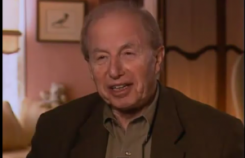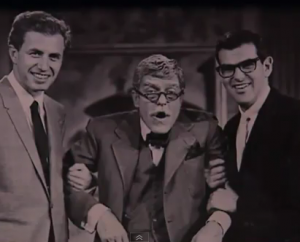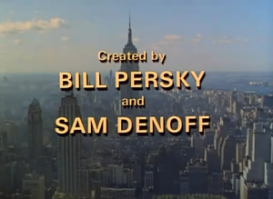TV Comedy Writing Legend Sam Denoff has Died
 Very sad news, the Archive of American Television has learned that TV Legend Sam Denoff, not only an Archive interviewee, but someone who passionately supported the Archive as an interviewer, passed away on July 8th at the age of 83.
Very sad news, the Archive of American Television has learned that TV Legend Sam Denoff, not only an Archive interviewee, but someone who passionately supported the Archive as an interviewer, passed away on July 8th at the age of 83.
Sam began his prolific career in radio at WNEW in New York and later moved to Los Angeles to work in television, starting with The Steve Allen Show. He worked on The Andy Williams Show before landing a job with partner Bill Persky on The Dick Van Dyke Show, where he and Persky co-wrote such classic episodes as “Coast-to-Coast Big Mouth” and "That's My Boy!" He and Persky then co-created and co-produced That Girl, starring Marlo Thomas, as well as the short-lived series Good Morning World. Other series he created include The Funny Side, Big Eddie, On Our Own, Turnabout, and The Lucie Arnaz Show. Denoff also wrote for such specials as: The Sid Caesar, Imogene Coca, Carl Reiner, Howard Morris Special (1967), The Bill Cosby Special (1968), Dick Van Dyke and the Other Woman Mary Tyler Moore (1969) and Hallmark Hall of Fame: “The Man Who Came to Dinner,” with Orson Welles (1972). He also wrote for The Annual American Comedy Awards and working as a consultant for the Jerry Lewis MDA Telethon. Along with being an Archive of American Television interviewee, Sam contributed his time as an Archive interviewer -- he conducted historic interviews with TV Legends Sheldon Leonard, Art Linkletter, Jerry Lewis, Hal Kanter, and Charles Cappleman.
Here are some excerpts from his March 9, 2000 Archive interview:
On being hired to write for The Steve Allen Show in 1961
We [Denoff and Bill Persky] were going to be the last two hired on the writing staff -- the two of us and another new writer called Buck Henry. Did they love our material? We found out they never read the material. What happened was there was a meeting and names were being thrown out. Our name came up and Bill Dana said, "Sam Denoff, I know Sam, he and I were pages together, he’s really funny. He’s good." Steve said, "book him." That was Steve Allen, we’re talking about generous, nurturing people. Steve Allen is one of those giants. He has started off the careers of so many people, performers and writers, Billy and me among them. But his attitude was if somebody said, hey, "I know this guy, he’s a good singer," Steve said, "put him on the show. What could it hurt, if they’re no good, they’re no good." So we got the job. It was a three-week contract... They liked what we were doing. I brought my family out, which was good, but it was bad because the show was canceled after fourteen shows. But, one thing leads to another, if you just go ahead and do your work. I think it’s important to say that our ambitions were not to be producers. We wanted to be, get a job as a writer and work as writers. And especially for variety shows, because we knew we had a good sense of satire and doing satirical sketches.
On writing the classic The Dick Van Dyke Show episode "That's My Boy"
"That’s My Boy" was our first episode, and certainly it was exciting. It evolved to being a momentous moment in the show's history. It was the opening show of the third season and the story was that Dick was obsessed with the idea that their son Richie was the baby of another couple whose wife was in the hospital at the same time giving birth. And all the evidence that he could dig up, it was very funny being this precise, almost an Inspector Clouseau character -- he says, their name was Peters, ours Petrie, very close names, and you were in room 387, and she was in room 378.... At one point, he was even going to footprint the baby, when Laura caught him. Of course, he had to keep all of his suspicions to himself, which is a great comedy device. He didn’t want to upset his wife. Anyway, he finally calls the Peters family, and says, "my name is Petrie and you guys had a baby the same day as my wife, etcetera, etcetera, etcetera, and I think we have to deal with this fact that we may have the wrong babies." He tells Laura and of course, she says, oh that’s ridiculous! He says, no, sweetheart, I’m sure...the doorbell rings and in walks Greg Morris and his wife, the black actor, Greg Morris, who became famous on Mission Impossible. When he walked in that door, the audience exploded and they didn’t stop laughing. I think Sheldon [Leonard] and Carl [Reiner] have said that’s the longest single laugh ever on that series. But the joke was not on the black couple, the joke was on Dick Van Dyke, the schmuck. As Dick Van Dyke used to say, schmuckery is the best thing you can do. Have a guy who thinks he’s something else and he’s being a schmuck. Well, that stunning laugh, and then with Greg Morris and his wife characters just standing there laughing at him, because they came knowing what this guy would react to. It was one of the biggest surprises, which is one of the essences of a good comedy show. There was no hint. And, it was one of the first examples of using a multicultural storyline without being condescending or getting into trouble.
[caption id="attachment_3288" align="alignright" width="300" caption="(l-r): Sam Denoff, Dick Van Dyke (in-costume), Bill Persky on the set of The Dick Van Dyke Show"] [/caption]
[/caption]
On the legacy of The Dick Van Dyke Show
I think The Dick Van Dyke Show deserves the attention that it gets today because it was done so well. And again, that’s not because of us. It's because of Carl’s [Reiner] vision and because of what, it absolutely deserves all the attention it gets. It’s one of the milestones of great television. Certainly a lot of great, wonderful shows have followed it. But I know a lot of the men and women who have written on those shows when they were trying to break in, like Billy [Persky] and me, and even the younger guys say that was like a landmark. A landmark piece of perfect kind of work. Absolutely.
On reuniting Dick Van Dyke and Mary Tyler Moore in the special Dick Van Dyke and the Other Woman
Mary’s career, after The Dick Van Dyke Show, had kind of a valley.... We thought it would be fun to do a special reuniting the two of them, which was called Dick Van Dyke and the Other Woman because people thought they were really married, that’s how believable they were. The special material was written by our friend, Ray Charles, and in it he wrote one number which, which was magical, "Life is Just a Situation Comedy," and they did a song and dance, little sketches in that. In the other memorable piece we had Dick and Mary as the two little bride and groom statues on the top of a wedding cake, waiting, at, at a wedding, but they talked to each other. And he doesn’t want to be there and she wants to be there, and she says, this is the most romantic thing.... And then, the wedding is over and they’re stuck in the freezer and we see them later taken out for the 25th anniversary of the couple and they’re all full of ice in the freezer. And the culmination of the number was really so sweet. They sang the great number from Fiddler on the Roof, "Do You Love Me." It was a terrific special. Mary, quite often, has credited that special with rejuvenating her career, which it did, because CBS said, "oh, wait a minute, why don’t we do a series with this girl, because she really is good." They’d forgotten about her. And then Allan [Burns] and Jim [Brooks] wrote The Mary Tyler Moore Show, which was great.
On working with longtime writing partner Bill Persky
Working with a partner, as Billy and I did for 20 years, we brought different sensibilities to the comedy writing. We both had tremendous respect for each other’s ability. He was into much more warmth than I was. A lot of partnerships are that way. But what evolved from our differences was a great dynamic which was that we would work together on every scene, we didn’t take separate stuff. When you work with a partner, you trigger each other. Very often people would say, who wrote that? And we said, the third person. A third writer evolves from the two different writers.
Writing comedy is a lonely job if you’re by yourself. That’s why there are so many partnerships, because you can bounce off each other. The writing process is so difficult that when you can do that and one guy’s personality is this one and one is that one, and you can reap from both of those two different personalities. I don’t want to go into details of what’s that different, because, because it cost everybody too much money in psychiatrist’s office to get through that, but, it worked very well. I mean, the main reason that the partnership broke up was because Billy really wanted to be a director, which he became. A very successful comedy director.
On co-creating That Girl
 While in the last year of The Dick Van Dyke Show, Danny Thomas, knowing it was the last year, would come into our office repeatedly, say, "hey, why don’t you write a show for my kid?" We said," Marlo? She’s terrific. Is she funny?" He said, "she’s my kid, she’s got to be funny." We hemmed and hawed because we were doing a pilot for another series at the same time called Good Morning World, about our experiences at the radio station WNEW. Finally, Danny said, "look, you've got to see her, she’s in London now working in 'Barefoot in the Park'. They gave her great reviews and they didn’t even know who I am. I’ll buy you a ticket and hotel." So, Billy and I fly off to London and we go to see her in the play and she was terrific. We came back and we started to talk about a pilot. She was known in her family as "Miss Independent". She always had that very air of independence about her. However, and I don’t know whether it’s true, but when she was an out-of-work actress in New York she lived at The Plaza, so I don’t know how independent.... the idea about being a single girl on her own in New York evolved from all of those discussions about this independence. They wanted to call it Miss Independence at one time. We didn’t like that, it sounds like a musical.
While in the last year of The Dick Van Dyke Show, Danny Thomas, knowing it was the last year, would come into our office repeatedly, say, "hey, why don’t you write a show for my kid?" We said," Marlo? She’s terrific. Is she funny?" He said, "she’s my kid, she’s got to be funny." We hemmed and hawed because we were doing a pilot for another series at the same time called Good Morning World, about our experiences at the radio station WNEW. Finally, Danny said, "look, you've got to see her, she’s in London now working in 'Barefoot in the Park'. They gave her great reviews and they didn’t even know who I am. I’ll buy you a ticket and hotel." So, Billy and I fly off to London and we go to see her in the play and she was terrific. We came back and we started to talk about a pilot. She was known in her family as "Miss Independent". She always had that very air of independence about her. However, and I don’t know whether it’s true, but when she was an out-of-work actress in New York she lived at The Plaza, so I don’t know how independent.... the idea about being a single girl on her own in New York evolved from all of those discussions about this independence. They wanted to call it Miss Independence at one time. We didn’t like that, it sounds like a musical.
So Billy and I wrote the pilot of her leaving her family who lived in Westchester and going down to live in New York. Discussion started about, okay, she’ll be a single girl. But then we said because of our training from Carl Reiner, she’s got to have a boyfriend. Why? Well, because we don’t want her to be single and what guy is she not going to sleep with this week -- especially in those days in 1966. She agreed. We wrote the script and hired Ted Bessell. The original pilot was recast. Some of the actors didn’t test well, that nonsense. We didn’t know at the time, we’re credited in books and articles by the feminist movement as being on the forefront of the feminist movement. No, we were trying to do a show for Danny Thomas’ daughter. We had no agenda. Maybe Marlo did at the time. She professes now that she did. I don’t know whether she had the agenda as this woman’s statement. She wanted a show.
On his work for the Jerry Lewis MDA Telethon
A fun job, as well as an often heartbreaking job is, is working as a consultant on the Jerry Lewis Telethon. Jerry is an old friend, I met him when I was at WNEW. He came in to town and William B. said, "this guy wrote that funny promo for you." So Jerry and I have known each other for a long time and though he claims to be nine years old, I think I’m a little younger than he is, emotionally. We keep having a lot of fun together. Plus, for that cause, it’s worth all the effort, you know, and we do that.
On how he would like to be remembered
As being tall and very good-looking.
See Sam Denoff's full Archive of American Television interview here.
